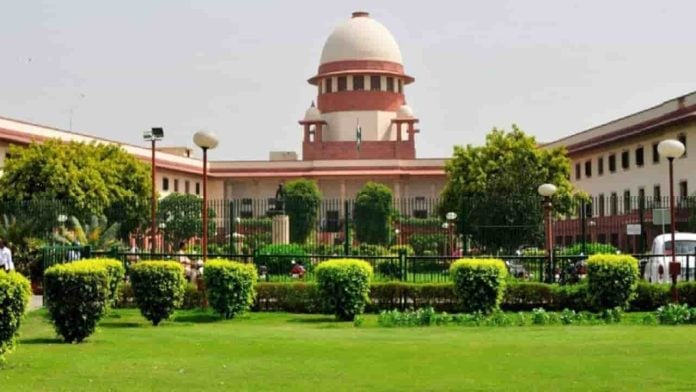The Supreme Court on Wednesday issued notice to the Supreme Court registry over the last mentioning made by Advocate Ashwini Upadhyay, challenging the notifications issued by the Reserve Bank of India (RBI) and the State Bank of India’s (SBI), permitting exchange of Rs 2000 currency notes without requirement of any identity proof.
The Vacation Bench of Justice Aniruddha Bose and Justice Rajesh Bindal sought a report from the Supreme Court Registry in the matter.
Advocate Upadhyay contended that he had mentioned a PIL in the Delhi High Court, seeking directions to ensure that exchange of Rs 2000 currency notes were permitted only with identity proof. However, the High Court rejected his application.
He said he moved the Supreme Court on the grounds of urgency of the matter.
When the Apex Court asked whether the petition had been mentioned before this court earlier, Upadhyay responded that it was mentioned earlier, but there were many defects at that time, which have been cured now.
The Vacation Bench said that when the petitioner was told by a Coordinate Bench to mention the matter on reopening of the Apex Court after the summer break, why did he mention it again before a different Bench.
Upadhyay alleged that money was being hoarded by the gangsters.
The top court of the country then sought a report from the Registry on the issue and granted liberty to Upadhyay to mention the PIL on Friday.
The BJP leader had mentioned the same matter before the Vacation Bench of Justice Sudhanshu Dhulia and Justice K.V. Viswanathan on June 1.
The Supreme Court had refused to entertain the PIL on the grounds that it would not take up such matters during the vacations and allowed Upadhyay to mention the matter once the Apex Court reopened post the summer vacations.
Earlier on May 29, the High Court of Delhi had dismissed a public interest litigation, which had challenged the notifications issued by the Reserve Bank of India and the State Bank of India, allowing exchange of banknotes in the denomination of Rs 2000 without the requirement of any identity proof.
The orders were passed by the Division Bench of Chief Justice Satish Chandra Sharma and Justice Subramonium Prasad on a petition moved by Advocate and Bharatiya Janata Party leader Ashwini Kumar Upadhyay.
The PIL had challenged the notifications on the grounds that allowing the deposit of banknotes in the denomination of Rs 2000 without any demand slip and identity proof was arbitrary, irrational and in violation of Article 14 of the Constitution.
The plea further sought directions from the High Court to both RBI and SBI that banknotes of Rs 2,000 be deposited in respective bank accounts instead of any other bank account, so that people with black money and disproportionate assets could be identified.
It further requested declaration of notifications published on May 19 and 20 as arbitrary and against Article 14 of the Constitution. .
Representing RBI, Senior Advocate Parag P. Tripathi opposed the petition and said the same must be dismissed with exemplary costs.
The Senior Counsel contended that this was not demonetisation. He said it was a statutory exercise, adding that none of the points raised by Upadhyay in any manner impinged upon the public issues.
Tripathi further referred to various judgments of the Apex Court, wherein it has been held that the courts will not be persuaded to interfere in matters concerning economic policy. He relied on cases – RK Garg vs Union of India and Small Scale Manufacturers Association vs Union of India.
Additional Solicitor General (ASG) Chetan Sharma appeared for the Central government. Respondents in the case include the Ministry of Home Affairs, the Union Ministry of Finance, RBI and the SBI.
The petitioner, however, contended that he had not challenged the notification as a whole, only as far as it allowed the exchange of currency without any proof of identity.
The petition further sought directions to the Union of India to take appropriate steps against black money and disproportionate assets holders, in order to eliminate corruption and benami transactions, apart from securing the fundamental rights of the citizens.
On May 19, the central bank had announced withdrawal of banknotes in the denomination of Rs 2,000, saying that though it will remain a legal tender, but people were advised to deposit or exchange the same at bank branches or designated RBI offices till September 30.
As per the banker’s bank, individuals had the option to exchange Rs 2,000 banknotes for other denominations up to a limit of Rs 20,000 at a time at any bank, beginning May 23. However on May 20, a day after the announcement, the Central government clarified that there was no daily limit on the number of times to exchange notes.
RBI Governor Shaktikanta Das said on May 22 that banknotes in the denomination of Rs 2,000 were introduced with the primary purpose of quickly replenishing the value of money that was being taken out of the system via demonetisation.
As that purpose has been fulfilled and there were enough notes of other denomination now, the decision was taken to withdraw these notes, he said. As per Das, the printing of these notes had been stopped. He said people should see this particular exercise as part of RBI’s currency management operation.


